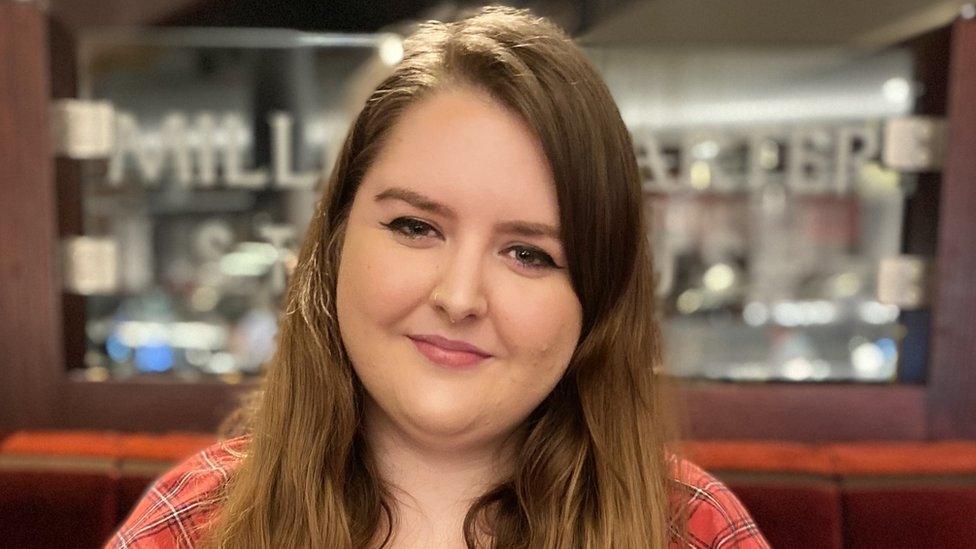Long Covid: Girl, 10, struggles to walk and talk
- Published
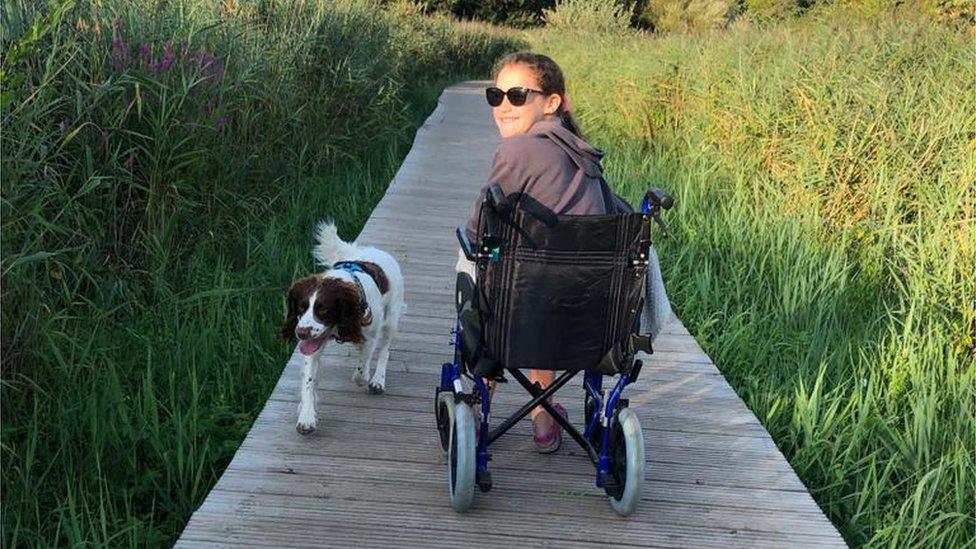
Libby has been in a wheelchair for five weeks as her long Covid symptoms have made her too weak to walk
A 10-year-old girl with long Covid struggles to walk and can barely speak, six months after catching the virus.
Libby caught Covid in February and is still struggling with extreme fatigue, constant headaches, and is using a wheelchair due to feeling too weak.
The Office for National Statistics, external predicted only 0.6% of people aged two to 11 in the UK had long Covid.
However, Kate Davies from charity Long Covid Kids said it could be higher as "many children go under the radar".

Libby says she misses walking her dog Finn, as well as kayaking and trampolining
When Libby, from Cardiff, grows up she wants to be a vet or police dog handler and loves kayaking, trampolining and swimming.
But she struggles even to stand and said she "feels terrible".
"Since having Covid I have a constant headache, can't sleep at night, am very dizzy and for the last five weeks I'm not able to stand or walk and need a wheelchair to get around," she said.
"I get breathless doing small things and I am not able to do much."
Libby has barely been able to go to school since being ill and said she never expected to be so unwell.
"The first thing that happened was I lost my voice, then had a fever, backache, blocked nose, headache and fatigue. My throat was also really sore and very painful, which stopped me from sleeping as I couldn't get comfortable.
"I went to the doctors a few times and had antibiotics, but they didn't really help."

Libby hopes to feel better soon and is saving up for a kayak for next summer
She has been diagnosed with chronic fatigue as a result of Covid.
"The worst thing is not being able to walk and needing help from my mum and dad to do simple things," Libby said.
"I feel lonely at night because I am awake and I don't have much of a voice so I can't call when I need help."
She said she needed help doing even small things like getting snacks, washing her hair and has to be carried upstairs to bed because she does not have the energy at the end of the day.
"I miss school and haven't been able to go for the last few months as have been awake all night and slept most the day. I also miss my friends and doing gymnastics at playtime," she said.
"I haven't seen many friends as I don't have the energy and even talking wears me out and hurts my throat."
She said she has seen some friends who live nearby, but using a wheelchair has made things "tricky".
However, she wants to go back for her last year of primary school and is saving up for her own kayak next summer.
"I watched one of my brothers kayaking tonight and it made me feel more motivated to want to walk again.
"I hope I get better soon as it's not fun feeling poorly all the time."
'I feel guilty taking her brothers out'

Libby's mum Joanne says her daughter is putting on a "brave face" but is in "constant pain"
Libby's mum, Joanne, whose son also had Covid with Libby, said initially she wasn't overly concerned because "we've been told kids just get a cold and they'll be fine".
It was only when symptoms hung around after a few weeks she suspected it might be long Covid.
She said getting straight answers, quick appointments and understanding "felt like pestering".
She added, however, the NHS staff "have been great" but there needed to be more awareness so parents can get their children seen quickly.
"I've had parents ask why hasn't she been in school and stuff and I've explained and they'd be really sort of taken aback," she said.
She said it had been hard to see her daughter miss out on things she loved and said she "feels guilty" taking her sons to activities without Libby.
She said seeing Libby in "constant pain" was difficult but said her daughter puts on a "a brave face".
Libby's parents even had to set up a tablet in her room so she can message them if she needs help or needs painkillers, as she cannot come to them or call for help.
Joanne, who now works mostly from home to support her daughter, said she hoped Libby was on the road to recovery but worried about how much longer she will be suffering, with doctors telling her it could be up to a few years.
"It's tricky - she's very upbeat girl thankfully so she doesn't get too upset, which is surprising because I think I'd be in tears every day if I was suffering like her."

What is long Covid?
You are deemed as having long Covid if symptoms of Covid-19 have lasted more than 12 weeks
Recovery varies as some symptoms can improve quickly and others last longer
The chances of having long-term symptoms does not seem to be linked to how ill you are when you first get Covid
Possible symptoms of long Covid, external are extensive but can include brain fog, insomnia, chest pains, fatigue, and anxiety
Source: NHS.com, external

'Kids are falling under the radar'
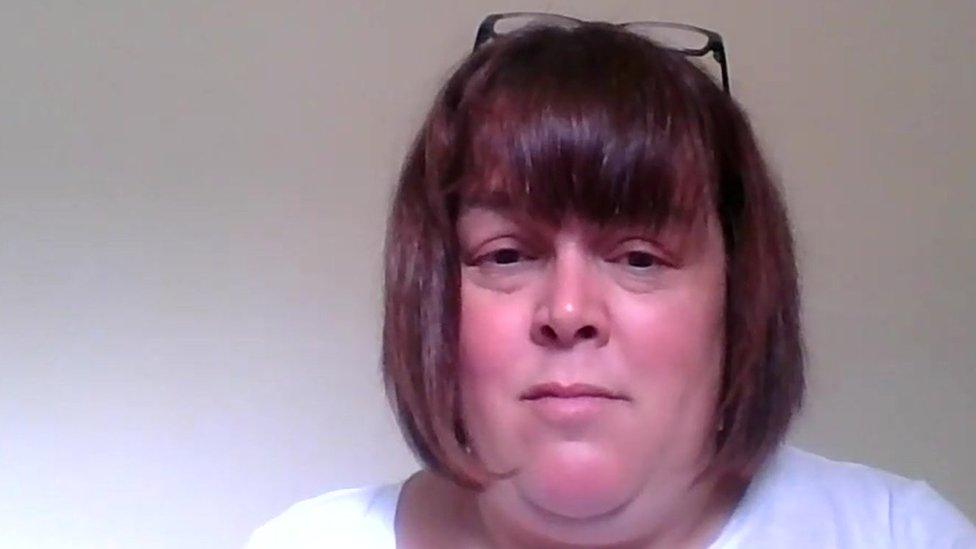
Kate Davies from Long Covid Kids says families need a point of contact to help navigate the condition
Kate Davies, of Long Covid Kids, said children often go "under the radar" due to a lack of awareness, as well as there being no precedent on how they will be treated.
Her own daughter Bethan, who was 16 when she was diagnosed, was passed between paediatric and adult care as they were unsure how to treat her.
"They told us it is like trying to fly a plane, but they need to build the plane first," she said.
She said she worried it could prevent parents seeking the right care at the earliest opportunity.
GPs need more support in signposting the children on and there need to be a "clear pathway" in which families can be referred with points of contact," she added.
"Yes it is good to say 'one size doesn't fit all' in relation to children, but they need a pathway families can go down because it is so fragmented and in many places there is nothing.
"Some parents are very frustrated with it."

How many people have long Covid?
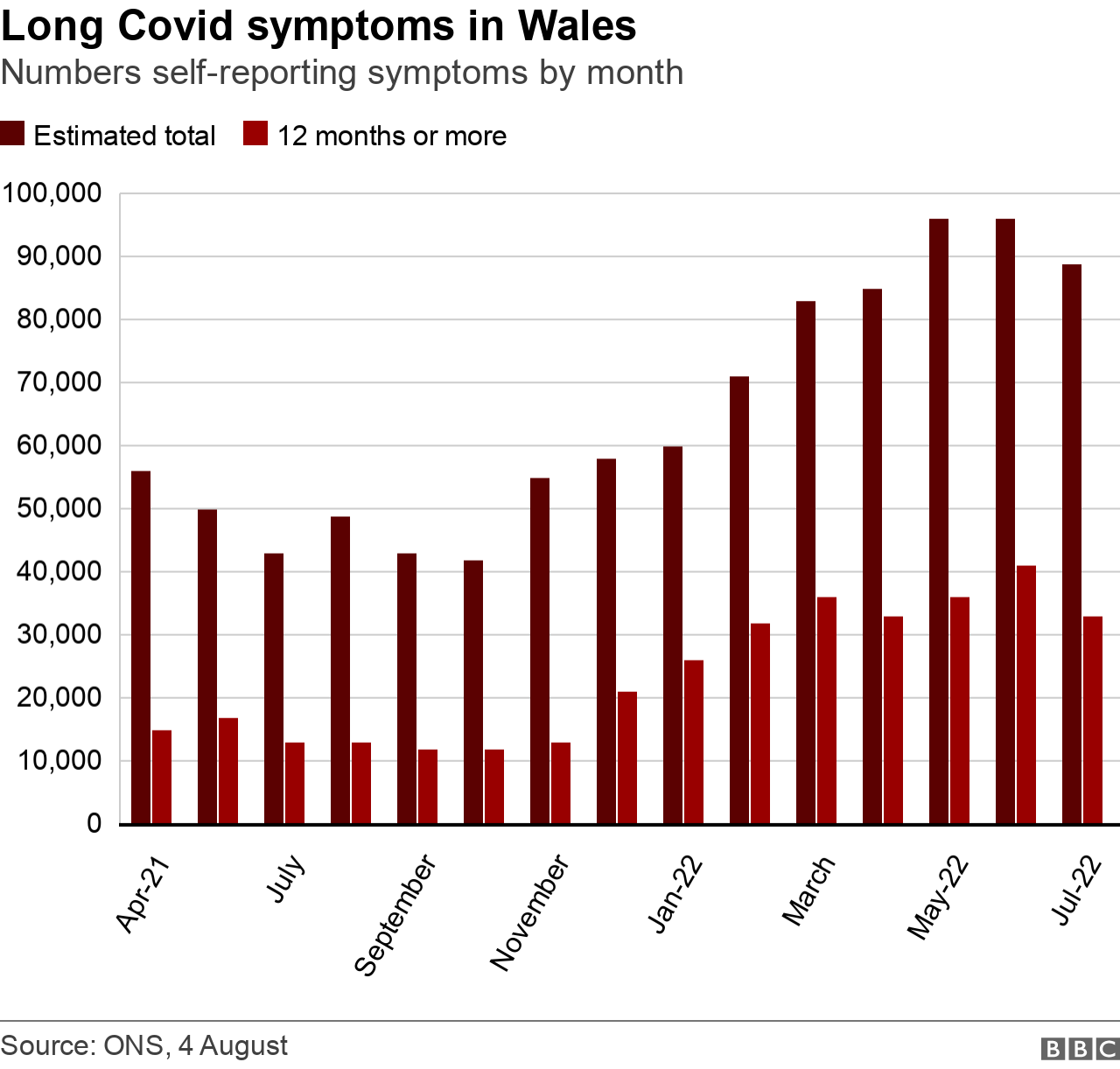
According to the latest Office for National Statistics (ONS) figures, slightly fewer people were reporting symptoms of long Covid - 89,000 - about 2.9% - estimated in Wales to be experiencing the long-term effect of having the virus.
This is down on the previous two months, which were the highest numbers reported since figures were collated by ONS.
In the latest figures, a decreasing number of people - 33,000 in Wales - were still reporting symptoms more than a year since having Covid.
Scientific advisers for the Welsh government estimated that potentially up to a quarter of people who have Covid may develop long Covid.
In January 2022, this would have included far higher proportions of Covid cases involving people aged between 50 and 70 - an estimated 43% of those with Covid.
But even if 6% of young people under 25 with Covid developed long-term symptoms, this could still mean more than 2,200 young people with long Covid in Wales.

A Welsh government spokeswoman said: "Health boards should follow NICE guidelines when treating children and young people with long Covid.
"Young patients should be provided with appropriate support and treatment based on their symptoms. So far very few children have presented with long Covid.
"As with adults are supported via the Adferiad Programme, external, children with the condition in Wales are being treated close to home wherever possible, and when clinically necessary, referred into Children and Young People Services for specialist advice.
"We have also established a Long Covid in Children and Young People's Group to develop our response for children affected."
Related topics
- Published8 February 2022
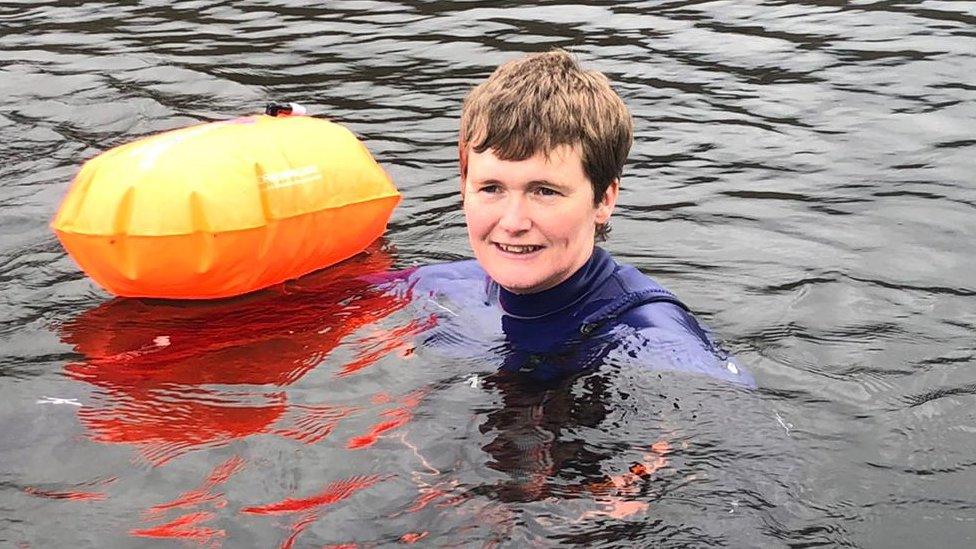
- Published31 March 2022
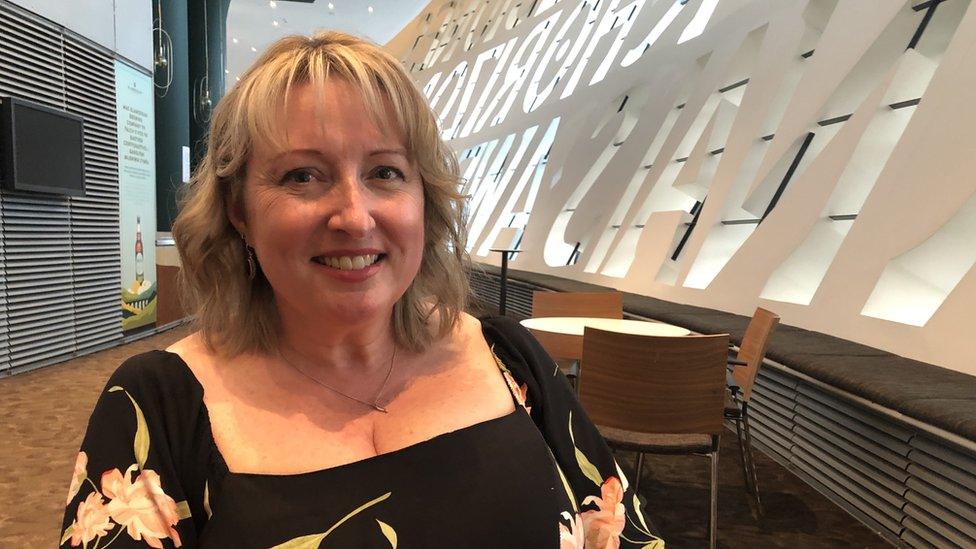
- Published28 May 2024

- Published30 June 2021
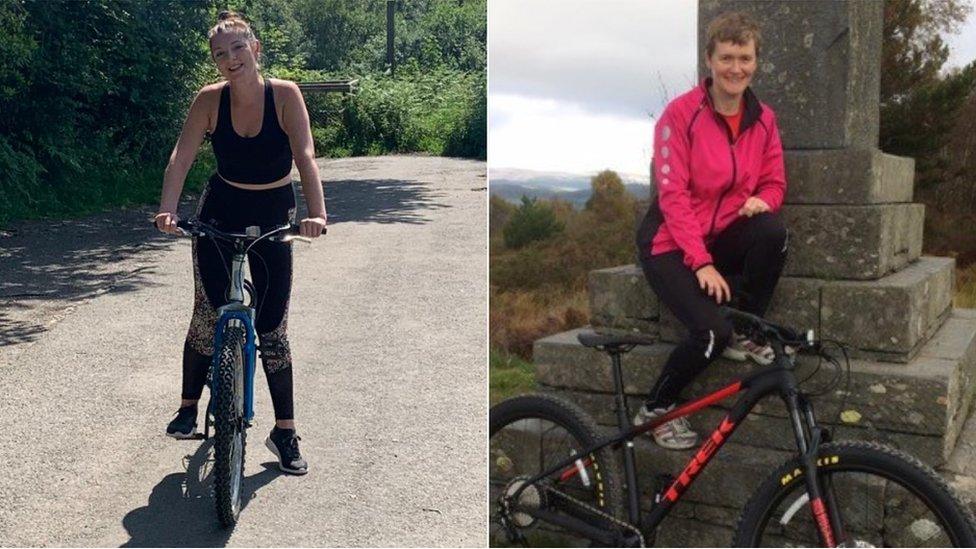
- Published10 March 2022
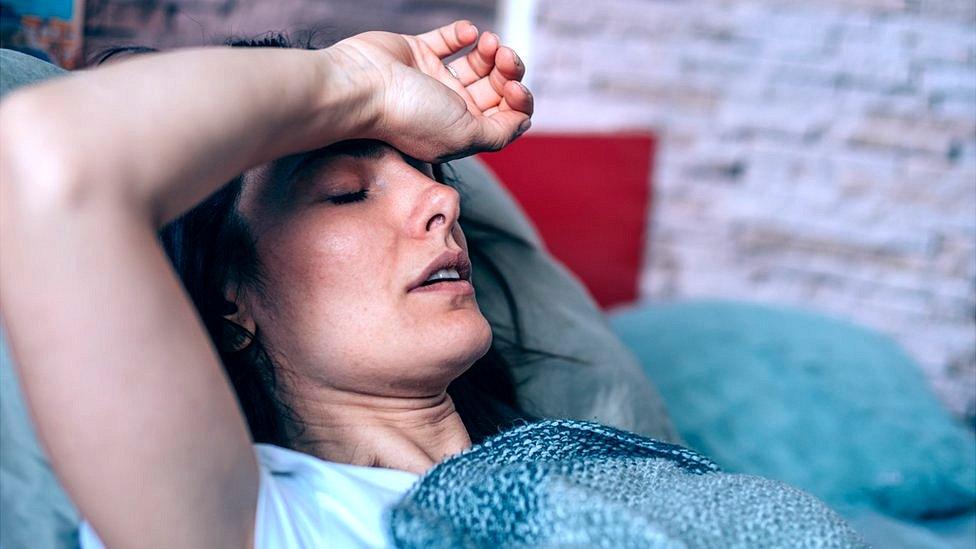
- Published3 March 2022
